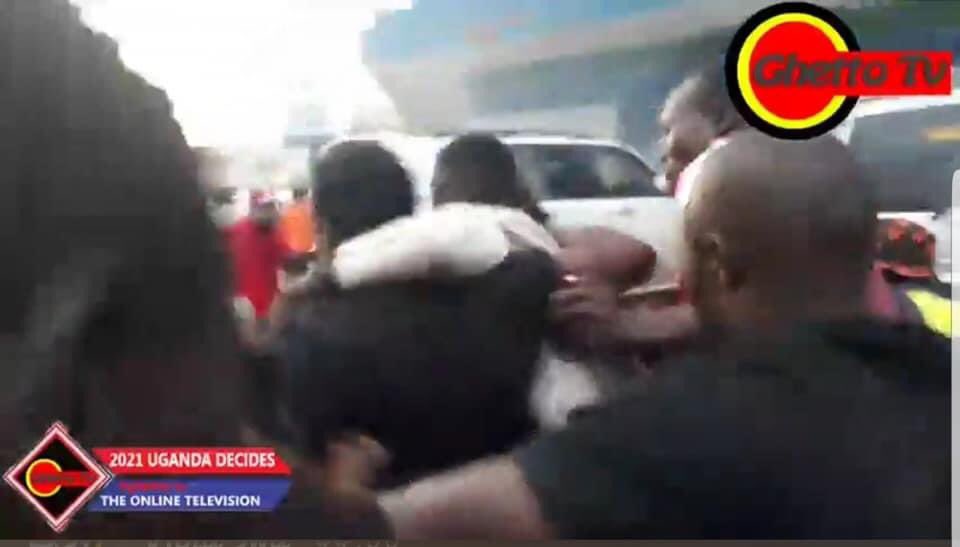He was a resident of Kassasa village, Kakuto road, Masaka. He was in town moving with friends when the protests started. After seeing many security operatives heading in his direction, he took refuge in a nearby hair salon. The security operatives forcefully dragged him out of the saloon and shot him and left. He was buried in Masaka.
Human Rights Uganda Case: Frank Baguma, 28
Date of death: November 18th, 2020.
He was a resident of Kabowa (Kampala outskirts), he operated a spare part shop. The deceased, Mr. Baguma, went about his business as a normal routine going to his shop to work and was in no way involved in the events of the protests. However; Mr. Baguma got caught in the reckless action of the Uganda law enforcement officers. According to an undisclosed witness, the deceased locked up his shop and joined neighbors on the road to watch. Shortly after, plain security operatives came chasing protestors while shooting at them with live bullets. One of the bullets hit Mr. Baguma in the head and splashed out his brain and he immediately fell to the ground as reported by an undisclosed eyewitness. He was shot dead in Ndeeba, rushed by friends and onlookers to Rubaga hospital where he was pronounced dead on arrival. He was buried in Kyekatebe, a village in Mityana, Uganda.

Case evaluation:
- The law enforcement officers identified as security operatives were in plain uniform identifiable by the guns they carried. This is a disguise of their identity and for the public not to readily identify the officer(s) in charge of the crimes.
- Extreme force was used by law enforcement that resulted in the death of 50 innocent Ugandans including Mr. Baguma.
Police Brutality: An upcoming MP speaks out.
No amount of words can express the anguish and pain of watching innocent Ugandans being gunned down just for letting their voices be heard. No conviction sentence can be long enough to pay for the crimes against humanity committed in such a short period – in broad day light.Fellow Ugandans, how long shall we stay silent? How many more must die before we all come out in unison to condemn and even demand the immediate arrest and prosecution of the Commander in Chief of such criminals? Where are you mothers of this land? Where are you fathers? Brothers and sisters, shall you stay in your confines of your comfort zones as more blood defiles our land?
I say again, this impunity must stop and there is no one to stop it but all of us – Ugandans who love our mother land.It makes one wonder, is it just for the love of power that you are killing your own ‘grandchildren’ or are you protecting what has become your cash-cow? We are aware that you and your mafias have robbed this country clean and have left we – your grandchildren with debt that even our own grandchildren may have to pay. Could this be the real reason you are murdering innocent blood?
Mr. Dictator Sir, I would like to remind you that 37 years ago, you claimed you were fighting for democracy for this country, have you totally lost your memory or were you simply fooling Ugandans? Today, you cannot stand seeing the love Ugandans have showed Hon. Kyagulanyi wherever he goes. How is it possible is the ‘democracy’ you fought for does not allow a Uganda to wave to his fans and supporters?
When you say, you will compensate those who have lost their lives, when you kill a man’s only son, is the money you are going to give going to raise sons for him so that his lineage will continue? Or will your peanuts be there to walk a girl down the aisle on her wedding day? Be informed that no amount of money can replace lives.
I know you are used to grazing cows and can pick and kill one for beef at any time you please, Ugandans are not cows that you can just slaughter and get away with it. The world is watching. The cameras are rolling. The pens are noting. You either stop this madness now and ask for amnesty while you still have a chance, or …………..!I call upon all those who haven’t spoken against this brutality to please come out and join the struggle to stop this slaughter. Do not wait until one of yours becomes a statistics. Speak up now.
I continue to thank Ugandans for coming out boldly and letting your voice be heard and those who have come out to condemn the bloodshed.
People Power. Our Power!
NYEKO DERRICKNUP FLAG BEARER – MP MAKINDYE EAST
The right to political participation: An overview to women and power in Uganda
The right to political participation under international law, is deemed to be the basis for the realization and protection of other human rights. It gives citizens of a given society whether primitive or civilized to have the authority and power to define the destiny and management of the affairs of the society. The international legal framework under the core-human rights treaties and in particular Article 25 of the International Covenant on Civil and Political Rights defines State obligations to ensure genuine enjoyment of the right without any discrimination.
In Africa, the African Union has been clear since its establishment on the right of political participation understanding well that it is vital for each countries’ independence and economic sustainability. As such, the African Charter on Democracy, Elections and Good governance of 2007 declared affirmatively under Article 2 that the principles of democracy, human rights and rule of law are fundamental principles of sustainable peace in the region and member states should adhere to ensure and promote free and fair political processes including the independence of the judiciary.
However, despite the existing legal framework including the national constitutions of many of the African countries, women have not yet fully given the opportunity to participate in the decisions that affect their day to day lives. Countries like Uganda for example, despite the available data that the NRM government has increased the direct participation of women in the parliament and cabinet, there is less evidence that such numbers have influenced change and purely represented the ideas of women in their constituencies. There are questions related to whether such women representatives have the power to express their views and take decisions in their capacity without being coerced. Further, despite the national and international efforts for development, women in Uganda and especially those in rural areas are still prone to extreme poverty and violence which is a clear sign of a gender that is still denied the right to define their existence in society.
Should economic empowerment be considered vital if we want to have effective political participation of women?
Grenade attack on Bobi Wine’s car
WRONGFUL ARREST BY THE REGIME
Bobi Wine’s bodyguard Nobert Elber Arihoin was pulled off the campaign trail and wrongfully arrested by the regime for a crime the regime committed on camera. He almost got hit by the same expired tear gun canister that injured both Bobi Wine’s music producer Dan Magic and personal bodyguard Kato. The NBS video proves that he did not throw the canister. The operatives carrying pistols on Bobi Wine’s campaign trail are walking free but People Power supporters are being intimidated and unjustly arrested. #ugDemocracyNow #MuseveniMustGo#PEOPLEPOWER_OURPOWER#FreedomUganda#StopPoliceBrutalityUG#WeAreRemovingADictator
The role of Independent and Accountable Electoral Institutions in minimizing electoral violence.
On a round table, we had different opinions among young African policy advisors who would wish to see Africa free from political violence and the peaceful transition of power. This is a real problem across the continent and as a Ugandan, I have always been inspired to understand why it is impossible to change governments by ballot. In searching for an effective solution, I have always wanted to understand why Uganda, despite its smaller size, has a history of political and electoral violence as compared to other East African Countries (EAC) like Tanzania. Of course, I am not praising Tanzania as having the best political fairness and the rule of law in the region, but it might be way far better on issues of peace and the absence of war in the region.
Uganda is one of the smallest landlocked countries in East Africa boarded with Kenya, South Sudan, the Democratic Republic of the Congo, Rwanda, and Tanzania. Uganda was not fully colonised by Britain but nevertheless it was controlled politically and economically until October 1962 when she became internally self-governed. Since its inception as a republic, it has passed through a series of political tribulations including civil wars. Uganda has always tried to work on democratization with all the regimes but it was not only until 1995 that the Constitution established a multi-party political system and the Electoral Commission that would later be responsible for managing and organizing electoral processes.
The birth of the Electoral Commission has been the foundation for electoral violence in the country and in fact, violence has been part of all the presidential and parliamentary elections since 1995. Violence is not only attributed to civilians but also security forces have used force against civilians on different occasions across the countries which sometimes have resulted to a number of deaths. The 2001 election witnessed such a level of violence that a parliamentary committee was set up to investigate the violence. International media houses and human rights organizations made several reports on the excessive use of force by security personnel which resulted to massive violations of human rights such as disappearances, torture, arbitral arrests etc.
It is very hard, and I am hesitant to compare the effectiveness of democracies by country since each country has its own democratic history however, there is a consensus that National Electoral Commissions play a great role in ensuring strong democracies. In fact, they help people have faith in democracy and in government institutions because free and fair elections guarantee legitimacy of governance. Thus, to ensure the independence, fairness and effectiveness of the Commission, there must be in place different governing legislation, including complementary regulations on accountability, institutional budgets and finances, on electoral offences which might be committed by election observers, direct supervision and auditing of the expenditures made by all political parties among others.
Suddenly, Uganda does not have an extensive legal framework on the Electoral Commission or elections in general, but I will make inference to its narrow and major three existing legislations that would help us better assess the effectiveness of democratic processes.
The institution of the Commission is established under Article 60 of the Uganda Constitution of 2006 (as amended). The Commission is composed of seven persons who are directly appointed by the president for a period of seven years renewable once. The president further has powers to remove any officer in office on grounds of inability to perform the functions of his or her office, misbehaviour or misconduct and incompetence. The Commission, therefore, is mandated to ensure free and fair elections through organising, conducting, and supervising; to manage or determine the voters’ register; to hear and determine election complaints. It is interesting to note here that despite the direct power of the president to appoint and remove a commissioner, the commission is presumed to be “independent and shall, in the performance of its functions, not be subject to the direction or control of any person or authority”.
The Electoral Commission Act, Cap 140 elaborates more on the mandate and the independence of the Commission. Section 2 provides its responsibilities related to electoral processes and in its capacity, it holds such a noble position and to determine the country’s future especially in those areas that are born within a democratic framework. However, its independence from the executive is questionable since it does not have a trust fund to independently manage its budget expenditures. Although on rare occasions it may get donations or grants from non-governmental stakeholders, its main budget is funded by the government.
The Political Parties and Organizations Act, 2005 regulates the financing and functioning of political parties and organisations, their formation, registration, membership, and organisation. However different from other EAC laws, the Commission does not have the direct right to audit and supervise the expenses incurred by the political parties during the electoral process, rather, parties are required to submit a statement (written document) declaring their assets and liabilities annually. In 2010 this legislation was amended and as such, section 14A gives the right to the government to use public funds and resources towards the activities of political parties or organizations represented in Parliament on an equal basis. Although this section has been functional, it benefits the incumbent parliamentarians hence excluding youths and in particular women from direct participation in politics. This legislation further would be considered as unfair to many Ugandans who could not finance their electoral campaigns.
Therefore, from its legal framework, there is a strong coloration between the structure, independency, and capacity of the Electoral commission in managing and organizing free and fair elections and to mitigate electoral violence in the country. As it has been noted, the Ugandan Commission holds the future of the Country for it is mandated to register voters, issue voter cards, and determine which party should be registered and to declare the final results. Uganda, however, still faces a great challenge in making democracy a reality due to the direct intervention of the executive, and lack of accountability on public finances. In fact, it was reported that just in 2016 presidential and parliamentary elections, Uganda spent 2.4 Trillion UG shillings. Thus in the absence of such formalities, violence is inevitable within the young generation who would wish to see a more inclusive political governance and economy.
It should be noted however that electoral violence in Uganda is not only attributed to the week and poorly organized Electoral Commission but also the presence of effective and independent institutions like the judiciary as well as the decisions taken by political leaders or the founding fathers of the nation plays a great role to ensure unity in the country hence minimal political violence.
In the lineage of the rule of law, Stephen Holmes notes that the decisions made by Political leaders in most cases determine the destiny of a country. They may choose to be bound by the law, rule by law or choose to change the Constitutions to remain in power. In fact leaders play a great role in ensuring equitable institutions are in place with equal distribution of resources and power. For instance, Nelson Mandera believed in reconciliation as the national tool that would create a stable country. His theory might not have made sense to many South African who had lived in an unjust society for decades but today such a model is appreciated in many African States and abroad. In Tanzania, Julius Nyerere made a strong foundation on the political culture when he introduced the Ujama policy. He aimed at making Tanzanians as one with socialist aspects. Such an inclusive political foundation has held the Tanzanian politics despite its diversity. In Uganda, things went off from the beginning; no leader has been consistent at creating an inclusive and unilateral political system. The majority of the regimes including Yoweri Museveni have been so corrupt and tribalistic in distributing natural resources and civil servant leaderships which has caused political fragmentations leading to electoral violence.
It should also be noted that, in such a fragmented and vulnerable country like Uganda, the only way that would have helped to bring unity and accountability to public institutions would have been strong institutions such as the judiciary. North Weingast underlines that strong and independent political institutions play a great role for political stability in a country since they serve each one of its citizens including the head of state equally. Daron Acemoglu and James Robinson in “Why Nations Fail” also notes that having inclusive institutions that allows all citizens to be included in decision making processes to attain their objectives contributes much to the Country’s political stability since each citizen feels part of the society. For instance, Kenya demonstrated the power of having an independent judiciary when it delivered a remarkable judgement in John Harun & Others Vs. the Independent Electoral and Boundaries Commission and 2 Others. The Kenyan Supreme Court gave a precedent when it annulled the results of presidential elections in 2017 and the Electoral Commission was obliged to re-organise another election.
Therefore, as a Ugandan youth, I am hopeful that this regime will have remorse for leaving behind failed public institutions that would have led to a peaceful Uganda. I am also hopeful that sooner we shall the National Electoral Commission restructured to function in a more free and accountable manner. This, among other institutional changes will ensure effective democracy and a peaceful transition of power.
Mary Goretti Byamugisha
Email: Lumosigorret@lawyer.com
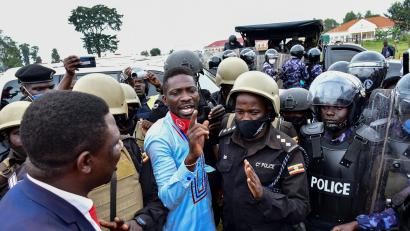
Unlawful Amuriat arrest
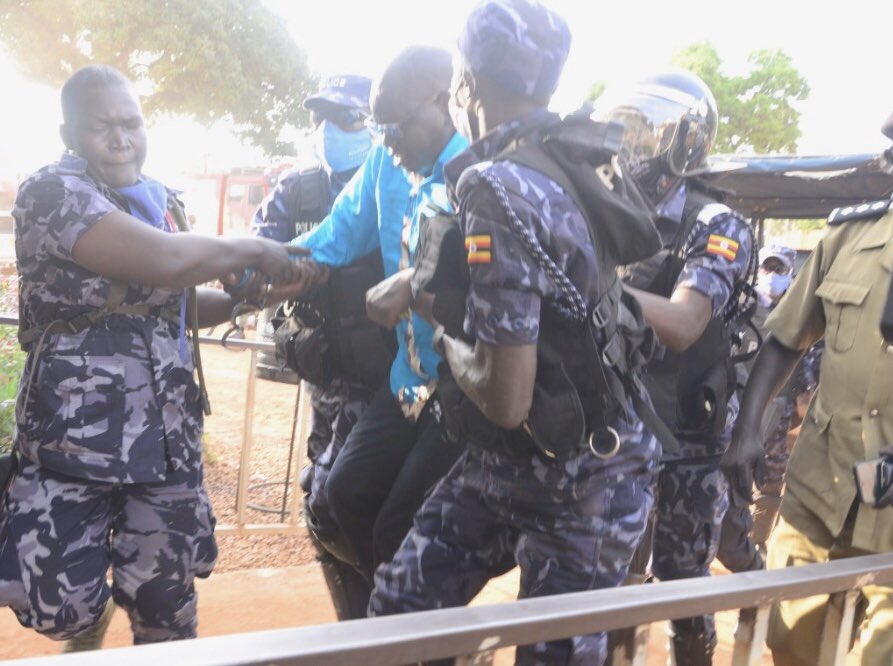
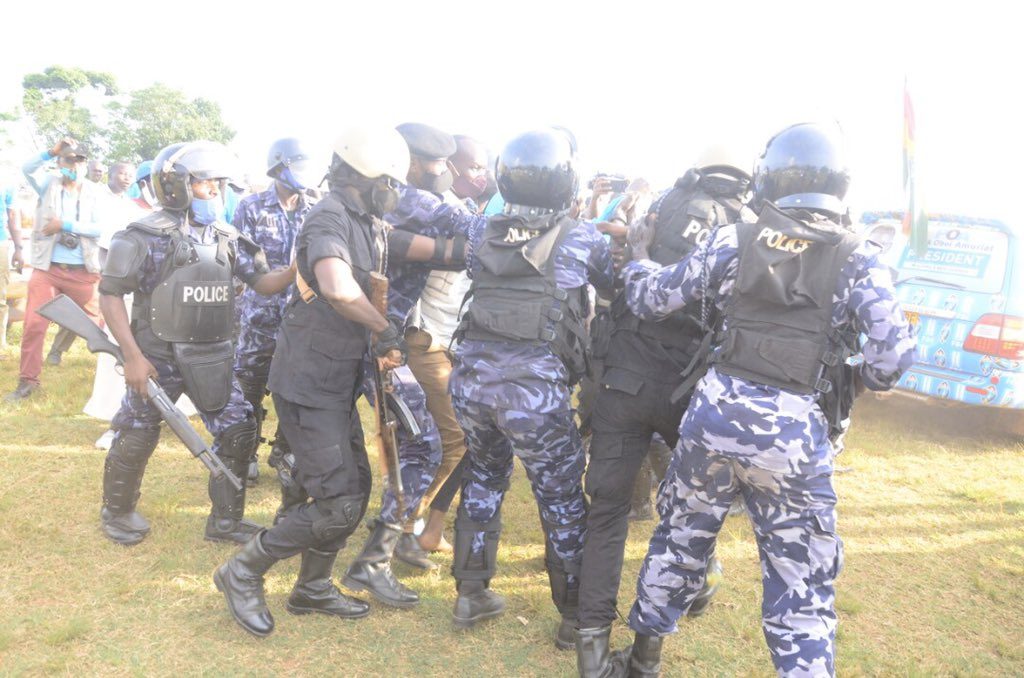
Patrick Oboi Amuriat was violently arrested at about 4.30pm today when he arrived in Gulu city for his campaign meetings. Many FDC supporters were also arrested; they’re all detained at Gulu CPS.
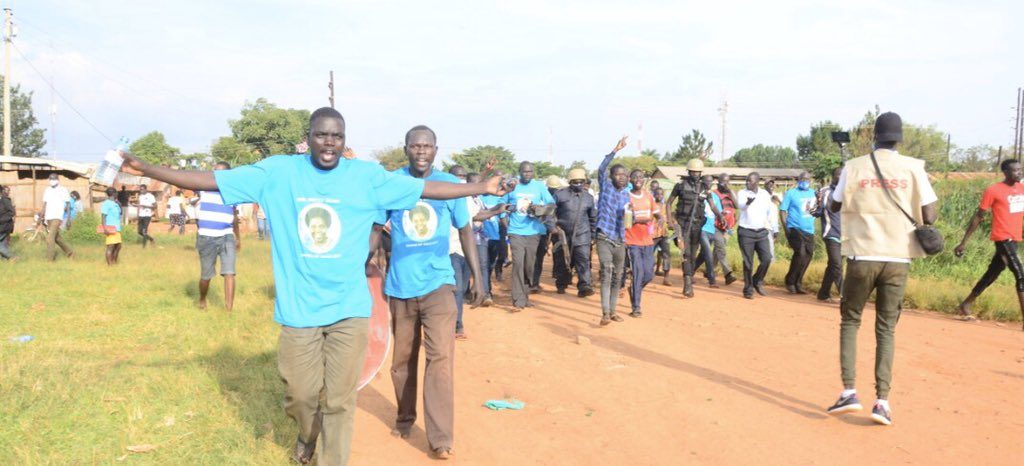
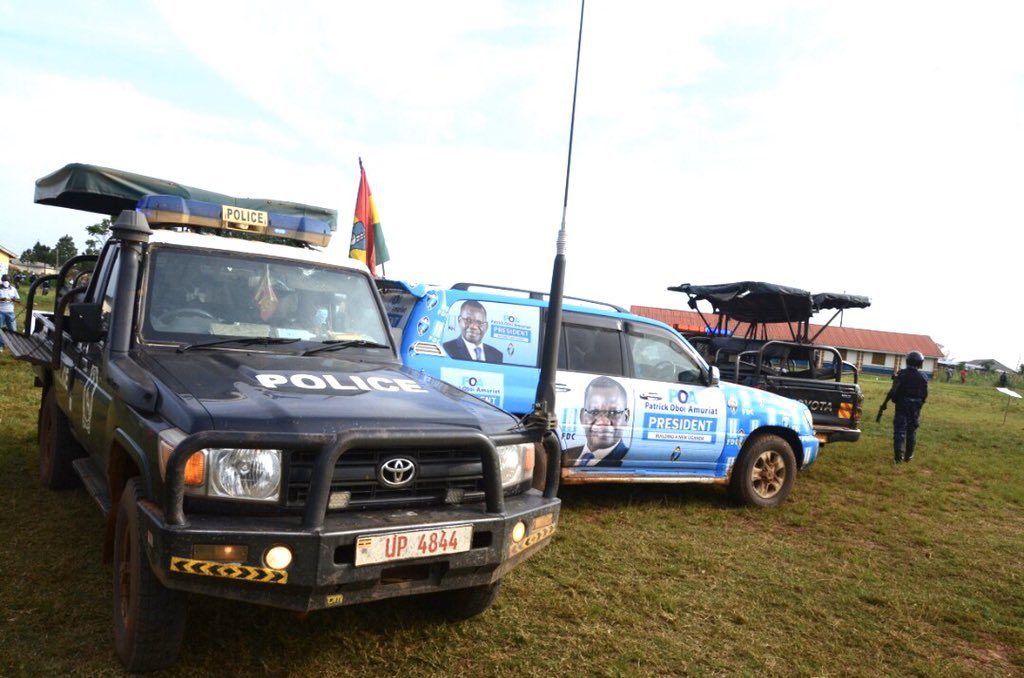
NRM car attack
In the aftermath of the arrest of Kyagulanyi, a yellow ‘NRM’ branded car drove into a crowd.
There are 5 casualties reported.
Luuka unlawful arrest of Kyagulanyi
[Story will be updated]
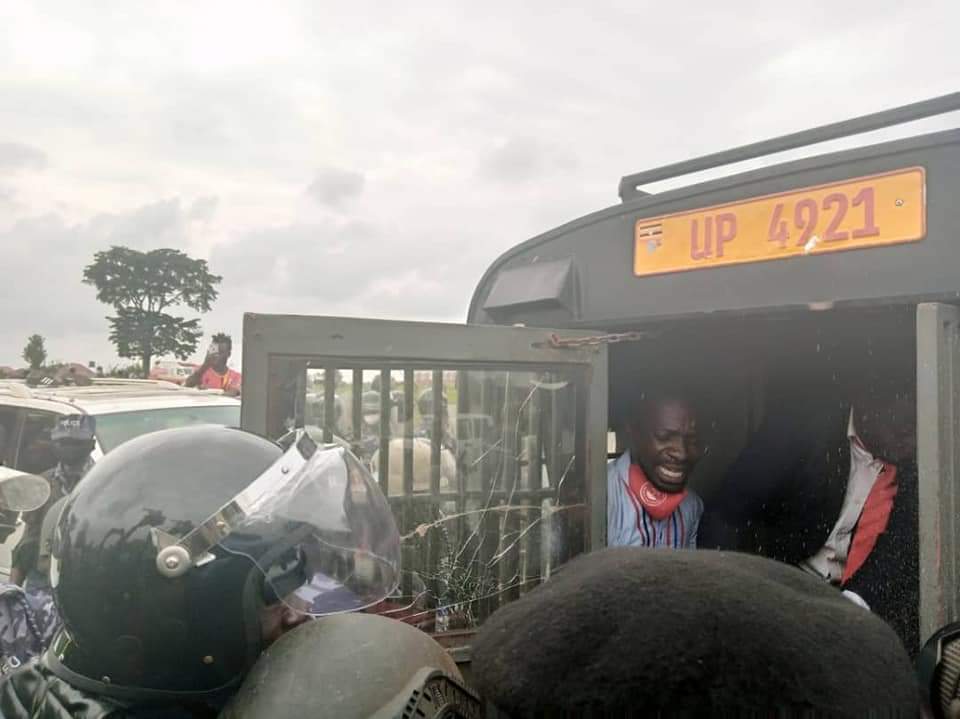
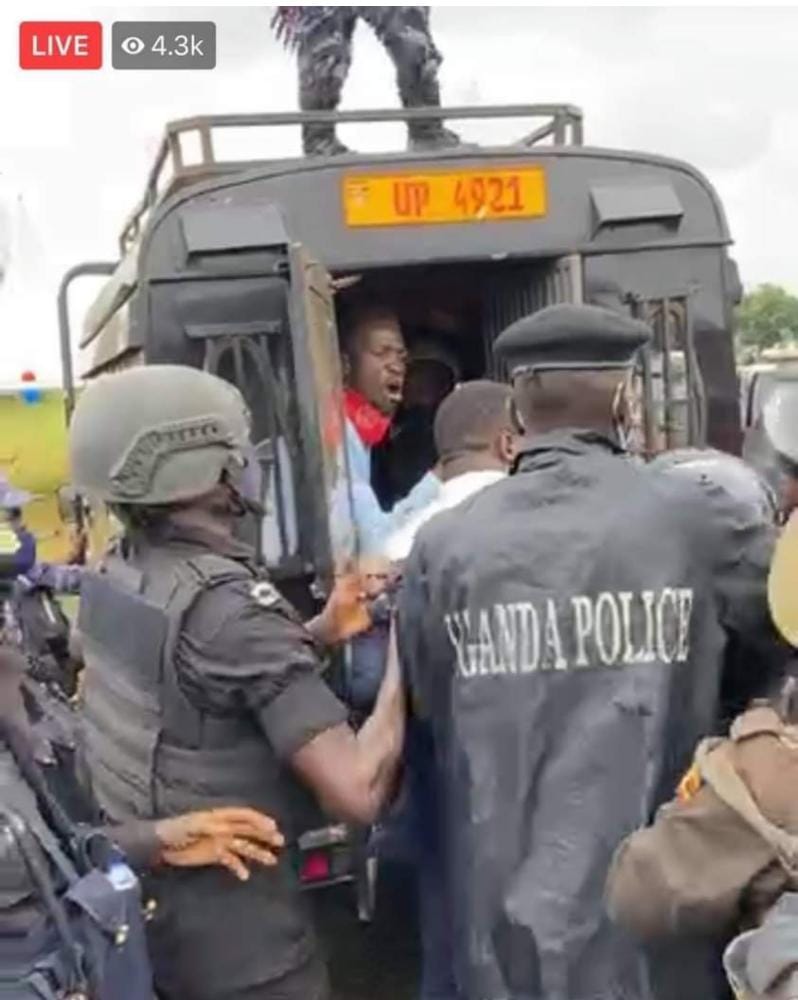

Mbale campaign violence
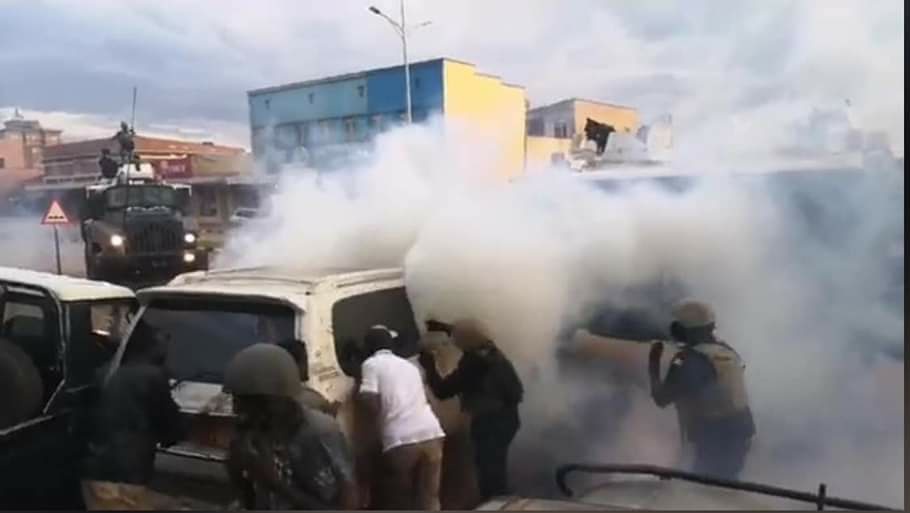
On Sunday 15th November Bobi Wine, presidential candidate for National Unity Platform, had a teargas canister thrown into his vehicle as he was heading for his campaign venue in Mbale city. This was done at the orders of ASP Asiimwe Abraham.
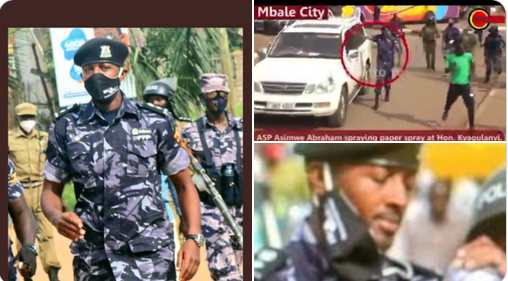
This happened right after his vehicle was rammed into by Uganda police both in the front and the back injuring a member of his security team. His security swiftly moved him to another car and drove off to the campaign venue.

Uganda police and the army has spent the entire day unleashing unnecessary violence (including live bullets) on his waiting supporters in the city in a similar manner. Bobi Wine managed to get to his campaign venue but it was already too late for him to address the supporters. One man is reported to have lost his life during the violence in Mbale on Sunday 15th.
